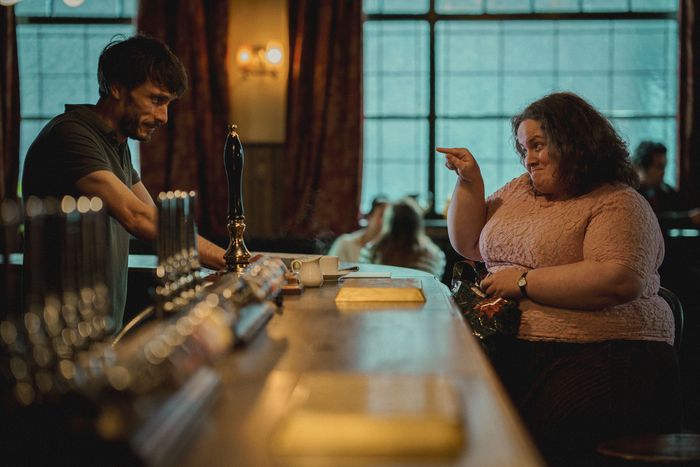
This article originally appeared in Gold Rush, a subscriber-only newsletter about the perpetual Hollywood awards race. Sign up here.
In the entertainment industry, as in life, truth can be a double-edged sword. Just ask creator Richard Gadd, who wrote, produced, and starred in Netflix’s Baby Reindeer, based on a pair of deeply traumatic experiences from his own life of being stalked and sexually assaulted. His story is now at the center of a lawsuit against Netflix that claims Gadd’s series is riddled with inaccuracies. Well, sort of.
There’s a delicate balancing act to the $170 million suit brought against Netflix by Scottish woman Fiona Harvey. She has come forward claiming to be the inspiration for the character of Martha on Baby Reindeer — the woman who stalks Gadd’s character, assaults his girlfriend, and threatens his family. However, Harvey is accusing the Netflix show of fabricating many of these details, including that she was a twice-convicted stalker and that she sexually assaulted Gadd. She’s suing for damages to her reputation as a result.
Gadd has repeatedly urged fans of the show to stop attempting to suss out the real identities of his victimizers. “We’ve gone to such great lengths to disguise her to the point that I don’t think she would recognise herself,” Gadd told GQ of the woman who inspired Martha’s character. “What’s been borrowed is an emotional truth, not a fact-by-fact profile of someone.” After the lawsuit was announced, Netflix released a statement explaining that the streamer intends to defend the case “vigorously and to stand by Richard Gadd’s right to tell his story.”
What this lawsuit means for Gadd and Netflix calls for expertise above my pay grade. But what interests me as an awards-season reporter is how this real-life dispute might factor into Baby Reindeer’s Emmy chances. With Shōgun having moved to the drama categories, Baby Reindeer is ensconced as the limited series front runner. (Gold Derby currently has it tied with Fargo for the best odds at a nomination.) It’s received rave reviews from critics to this point and has reportedly pulled in over 85.5 million Netflix viewers. In the past, entertainment-awards voters have been drawn to memoiristic or autobiographical series and movies that claim to be based on painfully true stories. Three years ago, Michaela Coel won the Emmy for writing for a limited series based on her own memoiristic story of abuse and survival, I May Destroy You. Like Baby Reindeer, I May Destroy You began as a performance at the Edinburgh Fringe Festival.
But if these true stories are revealed to have manipulated the truth too much — despite claiming to be fictionalized depictions — those same voters are quick to turn their backs. No one wants to end up on the bad side of the historical record. Showtime’s Escape at Dannemora, based on a true 2015 prison-break story, was nominated for 12 Emmys in 2019 but lost them all. Was that because the real-life prison guard who inspired Patricia Arquette’s character accused the show and executive producer Ben Stiller of making up “lies” about her for the purpose of a TV show? You can’t know for sure. Netflix series Inventing Anna and When They See Us have both led to defamation suits from the real-life subjects in those movies. It’s tough to glean concrete lessons about what those meant for Emmy success, given that When They See Us was a huge Emmy hit and Inventing Anna’s comparatively fewer Emmy nods may well have been because the show itself wasn’t very good.
If we want to look to the Oscars for guidance, the lessons are just as murky. Remember Denzel Washington’s 1999–2000 Oscars campaign for his role as boxer Rubin Carter in The Hurricane, where the actor was viewed as a front runner by Oscar experts until journalists raised a fuss about the liberties that director Norman Jewison took with his adaptation of Carter’s autobiography? Even historical fiction could be vulnerable; Harvey Weinstein was infamous for accusing rival studios of playing too loose with the facts in attempts to dampen the buzz around truish stories like Saving Private Ryan and A Beautiful Mind. At the same time, other slightly fudged based-on-true-story movies like Spotlight, Argo, 12 Years a Slave, Erin Brockovich, or even — avert your eyes — Green Book have pushed through campaign season mostly unscathed.
Plenty of other TV shows in contention for Emmys this year deal with true-life inspirations, though for various reasons probably won’t get hung up on accuracy issues like Baby Reindeer. Ryan Murphy’s historical fiction, despite drawing heavily from the real-life record, has never been expected to demonstrate much biographical accuracy. In Feud: Capote vs. the Swans’s fifth episode, writer Jon Robin Baitz fully invented an episode-length interaction between Capote and his queer literary contemporary James Baldwin that serves as both a time capsule and also a propelling action for the season’s arc. Historical fiction is also what allows The Gilded Age to glide by with its inspired vision of late-19th-century New York, sprinkled with real-life Astors but few fact-checkable details.
But of course, there’s The Crown. Peter Morgan’s gossipy ode to the perseverance of the royals had always been the subject of “how accurate or not?” questions, particularly given how often the show gave us Elizabeth’s private perspective on public events. As mid-20th-century history gave way to late-20th-century innuendo, fans and critics took a more critical eye, especially as fans of the show started doing unhinged things like sending hate mail to the real Camilla Parker Bowles for things that her character (played by Emerald Fennell, lest we forget) did on the show. By season five, when Princess Diana stepped into the timeline, people like Judi Dench and former prime minister John Major were calling for a disclaimer to be put on the show to clarify that these were fictionalized depictions. Diana has always been a cultural flashpoint, and many fans and critics bristled at what felt like Morgan taking the side of the royal family against its prodigal daughter-in-law. In season six, these controversies extended to the way the show depicted Mohamed Al-Fayed, all but accusing him of setting up the paparazzi frenzy that led to the deaths of Diana and his son, Dodi. Coincidentally or not (this was also the year of the Succession sweep), season five of The Crown fared the worst at the Emmys.
Apple’s The New Look seems to have avoided scrutiny to this point, depicting as it does familiar names and real history behind rival fashion pioneers Christian Dior (Ben Mendelsohn) and Coco Chanel (Juliette Binoche) during the Nazi occupation of France in World War II. The true story behind Chanel’s connection to the Nazis has long been a topic of discussion, and The New Look’s creator Todd A. Kessler spoke of a desire to hew closely to the documented history at hand. In doing so, the show never backed away from painting Chanel as a Nazi collaborator, even if the morality of the show was a little too comfortable and cozy. But I’m curious, if you’ve seen or heard of The Crown (and I’m confident you have), are you aware of or watching The New Look? A lack of negative attention might be a result of a lack of attention at all.
We still have time — voting for the 2024 Emmy nominations just opened on June 13 – both for voters to catch up on The New Look and to get a handle on what the accusations against Baby Reindeer really mean to them. Certainly the voters at the Gotham TV Awards didn’t seem to care much, considering they voted Baby Reindeer the winner in breakthrough limited series (over Shōgun, no less). In the meantime, other limited series — FX’s Fargo, Apple’s Lessons in Chemistry, Netflix’s own Ripley — could gain momentum among Emmy voters. In the end, TV shows based on true stories might look with some envy on a show like The Morning Show, which began as an adaptation of Brian Stelter’s book about the Today-show scandals involving Matt Lauer and Ann Curry and evolved into a fully fictional — even science-fictional — version of events. And if you think that’s the last time I’m going to take a sharp left turn in order to end this newsletter on a Morning Show note, you may want to check my own history.


